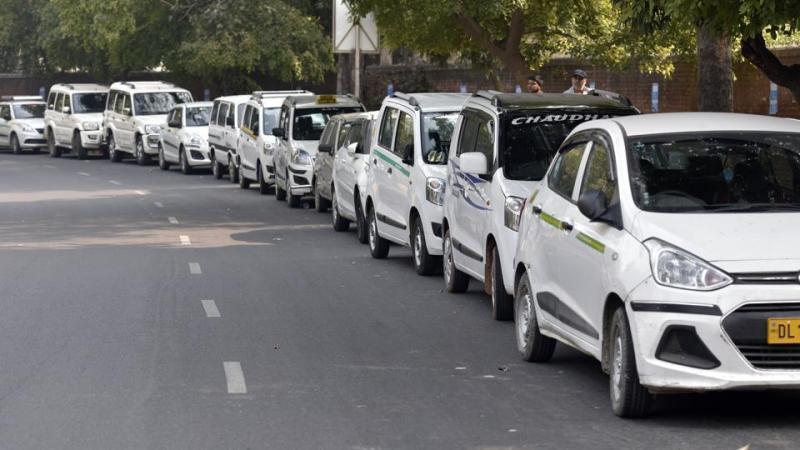It was a Friday evening when my friends and I decided to meet after an arduous week at work and to meet in person moving beyond the virtual life of chat apps. All of this in a WhatsApp group where the last lines read “Let us all meet at our usual place by 10:00 pm.” After I got home, put on a fresh change of clothes, it was a reflex to call for one of the convenient cabs from the free apps installed in my phone and set off. While I set off with a clear mind with thoughts of a fun night out with my friends, I witnessed that I was being watched from the rear view mirror that the driver adjusted in such a manner to have a clearer sight of me. It was extremely uncomfortable to have a pair of eyes fixed at you from time to time. While I quickly realized my vulnerability of being a lone women passenger at such an ‘unearthly hour’ I still mustered guts to ask him to adjust the mirror; to which he replied saying that “Madam, dekhna padhta hain… gaadi kahin se bhi aa jate hain” (Madam, I have to be watchful of cars, they tend advance from all sides). After a few minutes, I find him looking at me once again. At that moment, I found myself checking the duration left to reach my destination, I also get angry at myself for storming out of the house in such a hurry that I left my pepper spray at home, and I curse myself for not having told one of my friends to have carpooled together. In the meanwhile, I called one of my friends to talk to me for the remaining time duration till I reached the venue of drop off.


While I was on the phone, I told my friend about how I was made to feel, my friend told me to keep talking to her and also chided me for being so ‘gutsy’ at such an hour. I didn’t how to feel or whom to reach out to, but I just wanted to get to my friends who were expecting me in a few minutes. While my ride ended without much ado, and I found him staring at my body with a lustful gaze as I was walking out, and at that moment of conflicting thoughts and emotions I recall vividly feeling relieved and thankful at the same time for my safe arrival while also thinking of a million other things that could’ve happened to me. While I was walking into the place meeting my friends, I called the support staff of the cab service making a complaint against the driver, his mannerism and I was made to feel during my ride. The staff told me that would look into the matter and reimburse my travel cost for that ride. When I got off the phone, I wasn’t sure if reimbursing my amount was what I had reached out to them for because I wanted to hear something more reassuring – something such as “we will see that we will see to it that none of our employees will exhibit anti-social or threatening behavior in the future.”
That incident from that night wasn’t an untoward one, there are many cases such as that that affect women passengers who ride alone on these app based cab services. On an average, 9 out of 10 women casually talk about how they were harassed by their drivers ranging from refusal to take positively to directions, to refusing to drop off at the designated destination, to uncomfortable to lustful stares. This phenomenon however, is not restricted to a developing country such as India but is widespread in the ‘developed’ countries as well. A CNN investigation published in 2018 has found that at least 103 Uber drivers in the U.S have been accused of sexually assaulting or abusing their passengers in the past four years. The drivers were arrested, are wanted by police, or have been named in civil suits related to the incidents. At least 31 drivers have been convicted for crimes ranging from forcible touching and false imprisonment to rape, and dozens of criminal and civil cases are pending, CNN found. But what makes this a tough task is that there is no publicly available data for the number of sexual assaults by Uber drivers or for drivers of other rideshare companies. In India itself, there have been a number of incidents wherein drivers have stalked women passengers, falsely called them, harassed them, exhibited improper and violent behavior to times when women passengers were sexually violated, raped and even videographed threatening to leak them if authorities were approached. The recent case in Mumbai refreshes our memories of the horrific 2014 incident in Delhi and then we go on to ponder over our modes of transport in smart cities and the sensitivity of safety of women.
Every time an incident such as this is reported, popular cab apps such as Uber and Ola have expressed their concern and want for compliance on the issue stating it reviews the records of driver candidates that are surfaced to the company by its background check provider. It said any serious criminal convictions, like sexual assault, sex crimes against children and kidnapping, would disqualify candidates. However, it does not vouch for renewed background checks nor does it meet with drivers in person before allowing them to ferry passengers. Further, in India Uber and Ola have tied up with existing cab services that possess taxi permit holders based on the premise that the owner of the taxi is presumed to have done a background check on his driver and is therefore a reliable driver.
While the recruitment procedure still leaves many a question, there is the SOS button provision to send cab and location details when required but the PR team along with customer support have earned a reputation of delivering a half-baked job discrediting women complainants and providing for dissatisfactory remedial measures. While we understand that the onboarding procedure of these cab services is dangerously negligent, there arises a pertinent question as to why do they compromise with safety? This is explained by the logic that these app-based services are expanding in India and Uber just raised a billion dollars to expand in Asia. Like Indian competitor Ola, which also raised $250 million in a fresh round of funding, they are actively trying to attract drivers, both off the market and from one another and that their primary focus is on getting new drivers. So they may not necessarily be checking on a cab working across multiple services.
This brings us to the junction where we bring one’s attention to the issue of safety of while using these app based services, where one can safely infer that the apart from placing the onus of safety on women themselves, how far are these companies doing their bit to re-instill faith. Ventures that are profit oriented are also on the watch-list of the consumers and the public eye in general on whether feedback is treated seriously or trashed in the bin. In either of the cases, reporting of such cases is reflective of a conscientious society and thus embarking on the point that change can be brought about only by bringing incidents such as these to the fore.
.@GenderTrainings conducted a #workshop with @OlaCabs #driver #partners, in #Gurugram recently, focusing on #Gender #sensitive #behaviour. #BetaSikhao #GenderMatters #ThursdayThoughts @GenderCrusader @Su_Unlettered @SheoranSprint @ErikBombaywala pic.twitter.com/lMCst84wBn
— CSR (@CSR_India) April 19, 2018
Further, as a measure of review of the recruitment of drivers, there needs to be a mandatory introduction to the subject of gender and an elementary understanding of the issues related to gender crimes and sexuality, followed by adhering to a strict policy of legal compliance of punishing one in question with the objective of having a sensitized group of drivers and a congenial atmosphere of convenience along with safety for women passengers. Gender sensitized drivers are evidently bound to exhibit non-violent language skills, sharpened behavioural traits which will reflect on customer service satisfaction and an optimal driver rating which is a co-existent relationship. With rapid urbanization, and the large number of women folk up and about, these companies must launch the procedure of enrolling drivers and consider making gender sensitive approach towards passengers a part of the contracts.




